I found it necessary to add
an extra page:
The Tahitians had a list of 10 important star 'pillars' and the last of them was Polaris:
|
10 |
Ana-nia, pillar-to-fish-by |
North Star, α Ursae Minoris |
Their comment about Ana-nia (α Ursae Minoris) as a star 'to fish by' may have indicated that the position of Polaris was regarded as not on 'Land' but 'out in the Sea'.
And number 10 suggests this was a last star, which it indeed was if the solar year was beginning with the arrival of Sheratan and Mesarthim:
| April 15 |
16 |
17 (107) |
365 |
| Old year |
New year |
 |
 |
 |
| Ca1-25 |
Ca1-26 |
Ca2-1 (27) |
| kiore ki te huaga |
kua moe ki te tai. |
Te heke |
| no star listed |
POLARIS, Baten Kaitos (26.6), Metallah (26.9) |
Al Sharatain-1 / Ashvini-1 / Bond-16 |
| Segin, Mesarthim, ψ Phoenicis (27.2), SHERATAN, φ Phoenicis (27.4) |
| 'Sea' |
'Land' |
My list of stars has Polaris at right ascension 01h 49m which I have converted to day number 27.6 counted from March 21:
| Polaris |
α Ursae Minoris |
1.97 |
89º 02' N |
01h 49m |
27.6 |
| Baten Kaitos |
ζ Ceti |
3.74 |
10º 35' S |
01h 49m |
27.6 |
Then I reduced 27.6 with 1 day in order to reach the position of Polaris in relation to March 21 in 1870 A.D.
But possibly I should have reduced 27.6 with 1.4 days instead.
In my presentation above I have therefore changed my earlier rule of thumb according to which e.g. right ascension day 26.6 should be approximated with day 27 and instead used a new rule according to which 26.6 should be approximated with day 26.
Instead of reducing the RA (right ascension) day numbers for all the stars with a fruther 0.4 it was more practical to change my rule of how to approximate their day number positions in the glyph text:
| My old rule of thumb |
My new rule of thumb |
| 0.6 - 1.5 ® 1 |
0.2 - 1.1 ® 1 |
| 1.6 - 2.5 ® 2 |
1.2 - 2.1 ® 2 |
| etc |
etc |
Polaris ought to be not together with the First Point of Aries stars but 1 day earlier (like a 'Last Point of the Sea').
Metoro said kua moe ki te tai at Ca1-26 which maybe should be translated as 'sleeping out in the Sea'.
| Moe To sleep, to lie at full length, to dream, to brood, to place, to cohabit; moe atu, to leave off, to desist; moe atu ra, to adjourn, to postpone; moe hakahepo, to talk in the deep; moe aherepo, somnambulist, sleepwalker; moe hakataha, to sleep on the side; moe no, to oversleep, concubinage; moe tahae, to be a light sleeper; moe tahaga, a sleeper; moe vaeahatu, moe hakaroa, to sleep sprawling; rava moe, to sleep sound; ariga moe ki raro, to lie flat on the ground; tae moe, bachelor; hakamoe, to brood, to fold the wings; to reserve, to lay up; to struggle. P Pau.: moe, sleep. Mgv.: moe, sleep, to lie down, coitus, to shut the eyes. Mq.: moe, to sleep, to lie down; haámoe, to set down on the ground. Ta.: moe, to sleep, to lie down. Moea raruga, lying flat. Moeaivi, thin. Mq.: ivi, haáivi, id. Ta.: ivi, id. Moega, mat. Pau.: moehega, bed. Mgv.: moega, a sleeping mat. Mq.: moena, moeka, mat, floor cloth, bed. Ta.: moea, bed. Moemata, to sleep with the eyes open; mea moemata, phantom. Moemoea, a dream, vision; tikeahaga moemoea, apparition by night. T Mgv., Mq., Ta.: moemoea, dream. Churchill.
Mgv. Moemoe, to steal, to purloin at a food distribution. Mq.: moemoe, to seize, to grasp. Churchill.
Ta.: 1. Moemoe, ambush. Ha.: moemoe, id. 2. Moemoe, Phyllanthus simplex. To.: mohemohe, a tree. Churchill.
Mq.: Moehu, exiled, banished, prisoner of war. Ma.: morehu, a survivor. Churchill. |
| Tai 1. Ocean, sea (often used without an article); he-turu au ki tai hopu, I am going down to the sea to bathe. 2. To be calm, good for fishing: he tai. There exists a surprisingly developed terminology for distinguishing the phases of the tides: tai pâpaku, low tide; ku-gúgú-á te tai, tide at his lowest, literally 'the sea has dried up'; he-ranu te tai, when the water starts rising again; this is a strange expression, since ranu means 'amniotic liquid,' the breaking of the waters which precedes birth; in this phase of the tides the fish start coming out of their hiding places and swim to the coast in search of food; tai hahati, rising tide; tai hini hahati, tide as it continues rising; tai u'a, tai u'a parera, when the tide has reached its high; tai hini u'a, tide all throughout its full phase; tai hori, tide as it starts receding; tai ma'u, tide during its decreasing phase, right until it becomes tai pâpaku again; tai raurau a riki, the slight swell, or effervescence of the sea at a change of the moon. 3. Good spot for raising chickens; the stone chicken coops called hare moa, were built in places 'tai moa'. Ahé te tai o taau moa? whereabouts are the raising grounds of your chickens? 4. Song in general; song executed by a group of singers; ku-garo-ana i a au te kupu o te tai, I have forgotten the words of the song. Taitai, tasteless; said especially of sweet potatoes and other produces of the soil which do not taste good for being too watery; kumara taitai, watery, tasteless sweet potato. Vanaga.
1. Salt water; taitai, brackish, salty. P Mgv., Mq., Ta.: tai, salt water. Mq.: taitai, to salt. Ta.: taitai, salty. 2. Sea, ocean; tai hati, breakers; tai hohonu, depths of the sea; tai kaukau, tide; tai negonego, tide; tai o, ripple; tai parera, tide; tai poko, breakers; tai titi, tide; tai ua, tide, ebb; tai vanaga, ripple. P Mgv., Mq., Ta.: tai, sea, ocean. 3. Ta.: tai-ao, dawn. Mq.: takitaki te ao, just before dawn. Churchill. |
The creator seems to have arranged his text with a new year beginning where Sheratan and Mesarthim rose with the Sun in April 17. The First Point of Aries was a point in the sky (in space) and not a permanently fixed point in time (March 21).
One of the old names of Easter Island was Mata ki te Ragi, which perhaps should be translated as 'Eyes towards the Sky', and in the sky they could see not Polaris (which was too far in the north) but the Belly of the Whale (Baten Kaitos, ζ Ceti), which clearly demonstrated where Sun must have been in April 16 - viz. still in the Belly of Fish:
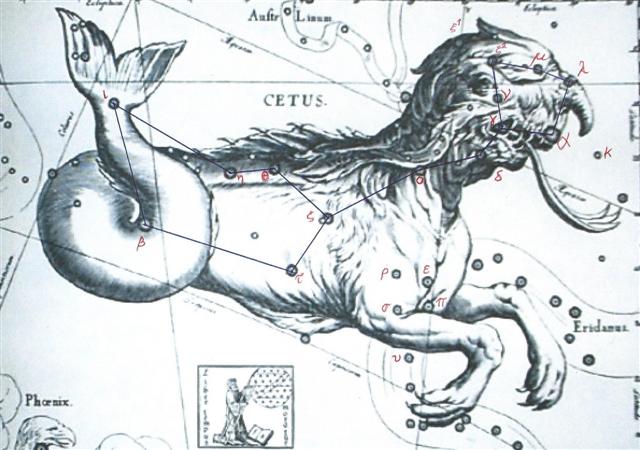

"...Then the big
Fish did swallow him, and he had done acts worthy of blame.
Had it not been that he (repented and) glorified Allah,
He would certainly have remained inside the Fish till the Day of
Resurrection. - Qur'an, chapter 37 (As-Saaffat), verse 139–144.
But We cast him
forth on the naked shore in a state of sickness,
And We caused to grow, over him, a spreading plant of the gourd kind.
And We sent him (on a mission) to a hundred thousand (men) or more.
And they believed; so We permitted them to enjoy (their life) for a while. -
Qur'an, chapter 37 (As-Saaffat), verse 145–148." (Wikipedia)
Possibly the figure in Ca1-26 illustrates the 'gourd' from
which life would spread out from the naked shore.
... But little Maui stood
up for himself. 'Well then, I'd better go, I suppose', he said. 'Since you
say so, I must be someone else's child. But I did think I was yours, because
I know I was born at the edge of the sea, and you cut off a tuft of your
hair and wrapped me in it and threw me in the waves. After that the seaweed
took care of me and I drifted about in the sea, wrapped in long tangles of
kelp, until a breeze blew me on shore again, and some jelly-fish rolled
themself around me to protect me on the sandy beach. Clouds of flies settled
on me and I might have been eaten up by the maggots; flocks of seabirds
came, and I might have been pecked to pieces. But then my great-ancestor
Tama nui ki te rangi arrived. He saw the clouds of flies and all the
birds, and he came and pulled away the jelly-fish, and there was I, a human
being! Well, he picked me up and washed me and took me home, and hung me in
the rafters in the warmth of the fire, and he saved my life ...
The reef is the beginning of an island
and this ought to be the place where the new year child should be born:
...
There is a couple residing in
one place named Kui and Fakataka. After the couple stay
together for a while Fakataka is pregnant. So they go away
because they wish to go to another place - they go. The canoe goes and
goes, the wind roars, the sea churns, the canoe sinks. Kui
expires while Fakataka swims.
Fakataka
swims and swims, reaching another land. She goes there and stays on the
upraised reef in the freshwater pools on the reef, and there delivers
her child, a boy child. She gives him the name Taetagaloa. When
the baby is born a golden plover flies over and alights upon the reef.
(Kua fanau lā te pepe kae lele
mai te tuli oi tū mai i te papa).
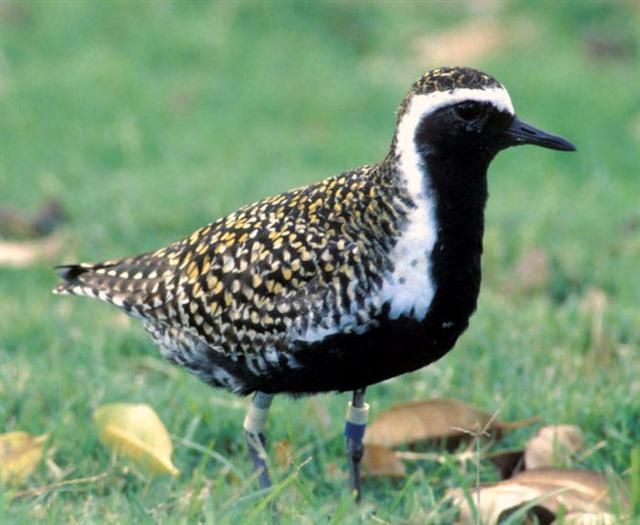
And so the woman thus names
various parts of the child beginning with the name 'the plover' (tuli):
neck (tuliulu), elbow (tulilima), knee (tulivae).
They go inland at the land.
The child nursed and tended grows up, is able to go and play. Each day
he now goes off a bit further away, moving some distance away from the
house, and then returns to their house. So it goes on and the child is
fully grown and goes to play far away from the place where they live ...
Possibly Metoro at Ca1-25 tried to
explain to Bishop Jaussen that this (April 15) was the place (-ga)
where the 'offspring', child, son, 'fruit' (hua) was generated
(inside the 'whale').
| Hua
1. Testicle. 2. Figuratively: son, hua
tahi, only son; fruits of the earth; to grow well (of
fruits). 3. To cause a fight, a quarrel. Hua-ai,
generation, as lineage of direct descendents;
contemporaries. Huahua, coccyx of bird, 'parson's nose':
huahua moa, huahua uha. Huataru, a
creeper (Chenopodium ambiguum). Vanaga.
1. The same; ki hua, again, to
continue, to strain, to struggle, to move, to repeat, over
and above. Mq.: hua, the same, to return, to
recommence. 2. To bloom, to sprout; flower, fruit (huaa);
huaa tae oko, huaa vahio, young fruit; hua
atahi, only son; huahaga, fruit; mei te
huahaga o tokoe kopu, the fruit of thy body; tikea
huahaga, deceptive appearance. P Pau.: ua, to be
born; huahaga, lineage. Mgv.: hua, to produce
(said of trees, grain, etc.), blooming time of flowers,
abundance of fruit. Mq.: hua, to produce, to bear
fruit. Ta.: ua, to sprout. Huahua. 1. Tailless
fowl. 2. Vein, tendon, line. 3. Mgv.: huahua, pimples
covering the face. Ta.: huahua, id. Mq.: hua,
tubercules. Sa.: fuafua, abscess on hand or feet.
Ma.: huahua, small pimples. Pau.: Hua-gakau,
rupture. Ta.: áau, entrails. Sa.: ga'au, id.
Ma.: ngakau, id. Churchill.
1. Fruit. 2. Egg. 3. Tā
hua = 'genealogical writing' or 'same writing'. Fischer. |
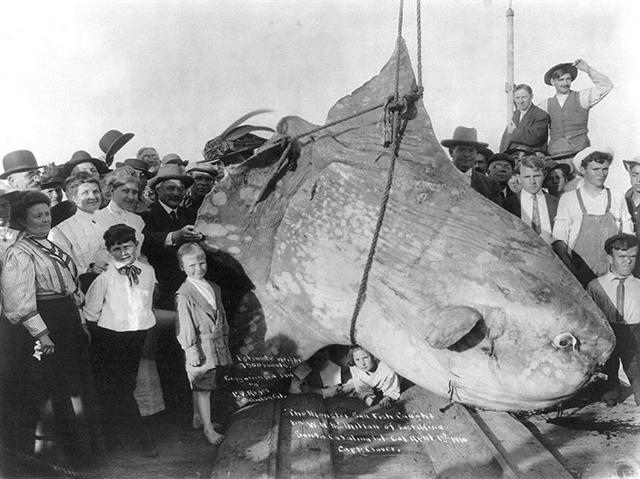
(Sunfish, Mola mola.)
"Many of
the sunfish's various names allude to its flattened shape. Its
specific name, mola, is Latin for 'millstone', which the fish
resembles because of its grey colour, rough texture, and rounded
body. Its common English name, sunfish, refers to the animal's habit
of sunbathing at the surface of the water." (Wikipedia)
The Sea Beast (the Cetus constellaion) could have been a fish after
all, because the sunfish feeds on jellyfish:
"Sunfish live on a diet consisting mainly of
jellyfish, but because this diet is nutritionally poor, they consume
large amounts to develop and maintain their great bulk. Females of
the species can produce more eggs than any other known vertebrate,
up to 300,000,000 at a time." (Wikipedia)
... Clouds of flies settled on me
and I might have been eaten up by the maggots; flocks of seabirds
came, and I might have been pecked to pieces. But then my
great-ancestor
Tama nui ki te rangi arrived. He saw the clouds of flies and all
the birds, and he came and pulled away the jelly-fish ...
|
A few further comments. The sunfish looks like a millstone and this
could explain why in ancient myth the Mill
which in the Golden Age produced Gold later
came to be located in the 'Sea' grinding out
Salt. The peculiar sunfish could be imagined
as one of the
millstones:
... Snorri Sterluson explains why 'Frodi's
grist' is a kenning for gold. Frodi ruled
during a peaceful and productive period,
contemporaneous with Augustus's Pax
Romana and the birth of Christ; hence
the kenning. There were neither thieves nor
robbers during this period, 'so that a gold
ring lay long on Jalang's heath'. Snorri
continues his account with the legend of the
mill beyond what is told in the song: The
girls' grinding produced an army hostile to
Frodi. On the very day of the girls'
predictions, the sea-king, Musing (Son of
the Mouse), landed on the Danish shore,
killed Frodi, and took away Grotti and the
women on his ship. The girls were bidden to
grind out salt on the mill. At midnight they
asked for further instructions. 'Keep
grinding', he told them. Then they ground
with such vigor that the ship sank. Water
poured into the eye of the mill, creating
the maelstroem of the sea. Therefore the sea
was salt. Incidentally, the mill was given a
kenning, Serpent's Couch ...
The sunfish is a fish
without tail:
"In German, the fish is also
known as Schwimmender Kopf, or
'swimming head'. In Polish, it is named
samogłów, meaning 'head alone', because
it has no true tail. The Chinese translation
of its academic name is fan-che yu
... meaning 'toppled wheel fish' ..."
(Wikipedia)
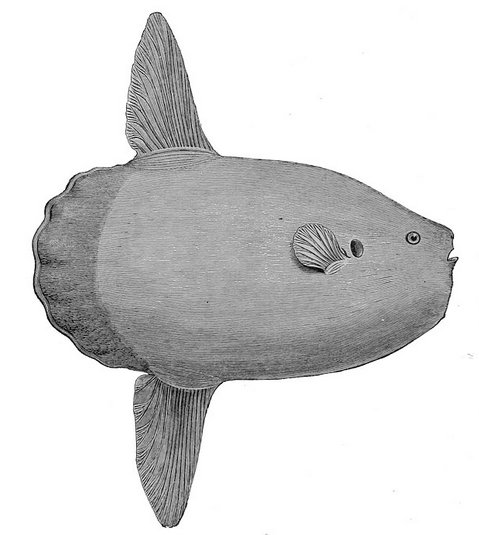
This in turn could
explain why the Bull of Taurus had no 'tail'
- no previous history, no past - because the
position was at the beginning of Sun time
(spring equinox, the 'reef'):
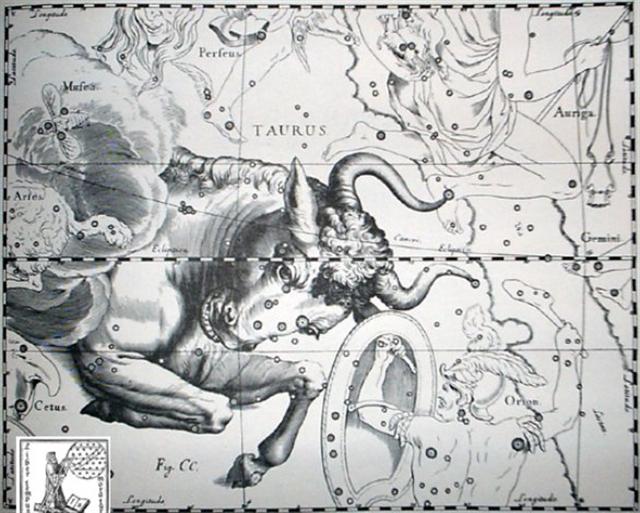
Or the causal connection between the Bull of
Taurus and the Sun-fish should rather be the
opposite, because Sun reached Taurus earlier
than Pisces in his precessional cycle. But
the emergence into sight from the clouds of
winter rains was in ancient Egypt
illustrated by the cow Hathor - they
always had it 'upside down' in ancient Egypt:
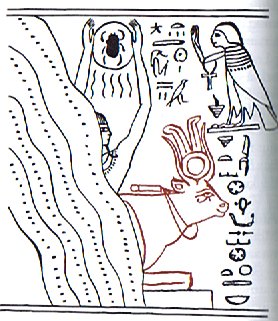
|








